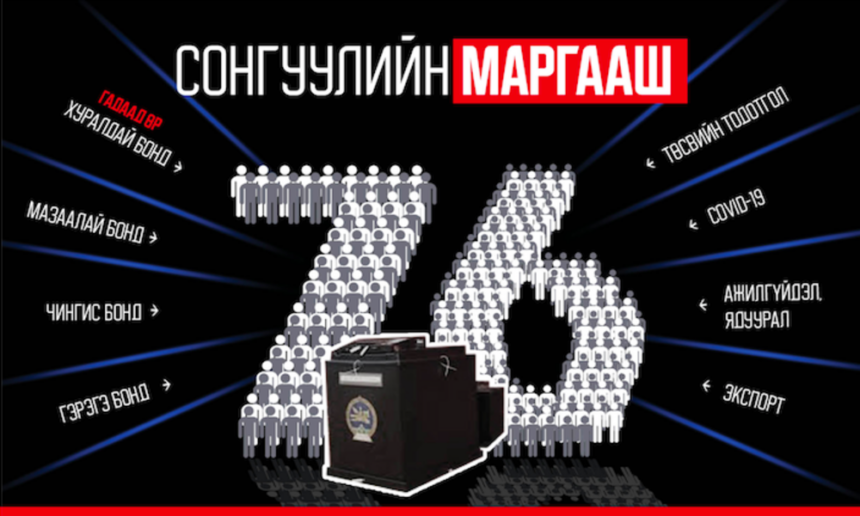Mongolia is holding its 8th parliamentary election on 24 June 2020. Life will still go on from the day after the election. However, the people of Mongolia, especially the government itself seems to have forgotten about the life after election as they are overwhelmed by election ads and campaigns. The day after the election: 76 new members of Parliament will be elected from 606 candidates currently running. Since some members of the parliament will lose their legal immunity and become ordinary citizens, their legal disputes will be (must be) filed. New members shall take an oath, elect a new Prime Minister, and new members of the cabinet will be selected. Which challenges await Mongolia’s new Government?
Impact of the Coronavirus Pandemic
The global economy is in a temporary deep freeze due to the pandemic. Its severe impact on households and businesses is increasing day by day. The World Bank confirms a dramatic rise in extreme poverty, amid sustained decrease in the last 20 years. The Mongolian economy shrank by 10.7% in the first quarter of 2020, compared to the same period last year. A 30% decrease of revenue in the mining industry was the main reason (The National Statistical Office, 2020). China – the country that buys more than 90 percent of our export – is witnessing 1% growth this year, lowest in the last 40 years, meanwhile Mongolia’s economy will shrink by 0.5%, according to the World Bank.
Every country is planning to implement state-aid frameworks to tackle the unprecedented economic crisis. Germany, for instance, is to invest an amount equal to 33% of its total GDP on stimulus programs, Japan will invest 21%, France 15%, the UK 15% and the USA 12% respectively. The total amount of stimulus packages of Western European countries will be on a scale of 4 trillion USD. Economists are warning of the worst economic crisis of the past 80 years. Countries are spending more than 10 trillion USD in their relief packages, which is three times higher than during the 2008 global financial crisis.
Internal and External Debts
Following the pandemic, mounting repayments on debts are due. Mongolia’s total external debts amount to 30.4 billion USD, including 7.2 billion USD government debt which is more than 60% of its GDP. The Bank of Mongolia is expected to pay 12 billion CNY to the People’s Bank of China this year, according to the swap deal. The external loans repayments are from following international bonds: Mazaalai bond which is worth 600 million USD and due in 2021, Chinggis bond worth 1 billion USD is due in 2022, Gerege bond worth 800 million USD in 2023 and 600 million USD of Khuraldai bond will expire by 2024. They amount together at 3 billion USD, and if the 2.5 billion debt of the Bank of Mongolia is included, it reaches 5.5 billion USD.
Simultaneous to the due date of foreign loan repayment, the parliamentary campaign promises and budget loss reduction will have to be delivered, which would cost a lot. At this crucial time, if the price of mining and mineral export sharply drops, the Mongolian currency Tugrik would depreciate, which will lead to risk of expanding the budget deficit. Despite the need to evade the financial crisis, escape routes are becoming increasingly limited.
What to Do?
It is obvious now that the economic slowdown due to the pandemic will last longer than expected. Mongolian government’s 5.1 trillion tugrik program to fight against the pandemic was not designed for long lasting measures. Therefore, new government’s priority will be a budget amendment, in order to overcome the crisis. In this case, how realistic are the election promises made by political parties? As for the ruling Mongolian People’s Party, no program to overcome economic crisis has been proposed yet. Their election promises are focused simply on reducing the poverty rate by half and on relieving the debt burden by setting ceilings on interest rates at maximum 1 percent per month. However, the biggest challenge for the next year will actually be just the prevention of an increased poverty rate, instead of trying to decrease it. The Democratic Party, on the other hand, is promising to save investment expenses by providing loans to individuals and businesses through budget amendments.
The new Government shall focus on the following three agendas to overcome the economic crisis, achieve growth, and increase its competitiveness.
One. A highly effective and skillful government needs to operate towards a clearly defined and feasible set of goals. Yesterday, the Chairperson of the Democratic Party, S. Erdene, revealed the name of the new Prime Minister, if they were to become majority. Cabinet members will be announced soon. This is good practice, which other political parties should also follow. By knowing their plan, the people can make a right choice, realizing who is able to save and rehabilitate the economy after the pandemic.
Two. Make budget amendments as soon as possible, avoid unnecessary investments and cut the spending. This includes the cost of certain buildings and luxurious work conditions of public officials, such as travel expenses. As the financial crisis due to the pandemic is expected to hit low-income households harder, a special social care policy must be developed. This policy can generate more demand on the market, while on the other hand, a provision of preferential loans to businesses can support the supply.
Three. A coin has two sides. The COVID-19 pandemic situation is boosting the demand for an online and virtual transition. The ideal way to avoid economic losses for the businesses is to rely on modern technologies. Also, management softwares can help business to improve productivity and become more flexible.
Above all, we, the people of Mongolia need to make the right choice. Choosing political forces that can carry out the above-mentioned measures will decide whether Mongolia will follow Venezuela’s or Finland’s path for the next decade. Are you going to vote for professionals or mere storytellers?
2020.06.17
Trans. by Riya.T and Sungerel.U












